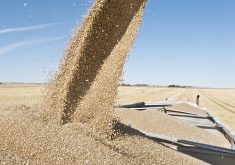LONDON, U.K. (Reuters) – Food security is a growing issue that makes agricultural commodities a top pick for 2011, says a commodity analyst.
Marc Bailey, managing director of Bache Commodities, also expects the threat of currency wars to propel gold to new records next year.
“Ags – the wheats, the corns, soyas – they’re the ones you need to own,” Bailey said.
“(Russian prime minister Vladimir) Putin has set an unprecedented tone of what the most important thing you need to do if you run a country is, and that is feed your people.”
Read Also

Soybean market still figuring out implications of China-U.S. pact
Soybean futures had a muted reaction to the U.S. trade deal with China as the market tries to figure out the nuances of the deal.
Russia imposed a wheat export ban earlier this year to secure domestic wheat supplies after a severe drought, which propelled wheat prices to two-year highs in August.
Bailey said meat such as beef will beat those where emerging market demand is capped due to cultural or religious beliefs.
“I would prefer beef over pork,” Bailey said.
“Don’t underestimate the Islamic influence in pork.”
Bache Commodities has $600 million under management tracking the Bache Commodities Index, an actively managed long only commodity index with a maximum 49 percent weighting to energy, 29.5 percent to agricultural commodities and 21.5 percent to the metals sector.
Political tensions arising from competitive currency devaluation are a prime driver behind gold’s rise to record levels, Bailey said, and further gains are expected.
“We’re going through a dynamic shift in the perception of what is a reserve currency,” he said.
“Gold is being pushed higher because it could be good as a reserve currency while we’re trying to work out what that should be.”
Gold, which hit record highs nearing $1,400 an ounce last week, could rise another $200 to $300 in the first half of 2011, he said.
“Gold could continue to go higher if we don’t see economic growth in the U.S. back with some sort of vengeance.”
Rising interest rates could stop gold in its tracks, but not because vaulting costs also rise and erode gains for investors. Rather, it would occur because they reflect renewed optimism over economic outlook, Bailey said.
“Interest rates do appear to drive gold lower, but I think that’s more because rates go up when the economy improves,” he said.
“It’s more a paradigm type of shift of thinking than the yield argument itself.”
Industrial metals are looking overextended and there is a risk of steep liquidation as speculators square up for Christmas, while demand from the West going into next year could prove more sluggish than many expect, Bailey said.
Crude oil prices, which tend to front run metals in an economic upturn because it is harder to store, remain well below record highs near $150 a barrel.
“What that is really saying is that there is a real chance that the economy for next year is slightly slower than people expect, and energy drifts lower and metals correct,” he added.














